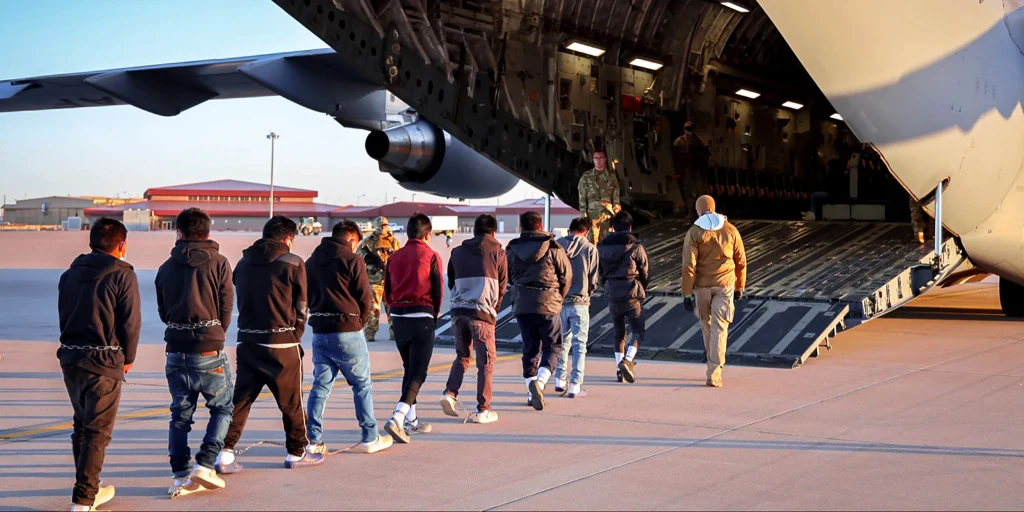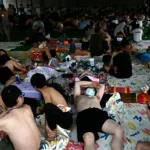In recent weeks, global attention has shifted to East Africa after Rwanda received seven deportees from the United States under a newly signed bilateral agreement. The deal marks a significant turning point in U.S. immigration policy and Rwanda’s growing role in international migration management. For many observers, this development is more than a routine deportation—it signals the rise of Rwanda as a strategic partner in global migration debates and raises urgent questions about human rights, international cooperation, and the ethics of deportation policies.
- The Background of the US-Rwanda Deportation Agreement
- Details of the First Deportations
- Rwanda’s Motivations for Accepting Deportees
- The Broader Context of US Deportation Policies
- Human Rights Concerns and Ethical Questions
- The Human Stories Behind the Numbers
- Rwanda’s Previous Migration Agreements
- Global Reactions to the US-Rwanda Agreement
- Economic Dimensions of the Agreement
- The Future of US-Rwanda Migration Cooperation
- FAQs
- What is the US-Rwanda deportation agreement?
- Why is Rwanda accepting deportees from the US?
- How many people have been deported under the agreement so far?
- What are the human rights concerns with this agreement?
- How does this compare to Rwanda’s other migration agreements?
- What does this mean for deportees and their families?
- Conclusion
The transfer of deportees has reignited discussions about how powerful nations handle migration, asylum, and deportation, as well as the responsibilities of receiving countries like Rwanda. It also underscores the complex human stories at the center of migration policy—families torn apart, individuals seeking better lives, and governments grappling with the challenges of sovereignty, diplomacy, and humanitarian obligations.
The Background of the US-Rwanda Deportation Agreement
The agreement between the United States and Rwanda was framed as a cooperative initiative aimed at strengthening bilateral ties while providing a structured process for deportations. According to officials, the accord allows the U.S. to deport individuals who have been denied legal status while ensuring that Rwanda plays host under regulated conditions.
This deal did not emerge in a vacuum. It follows similar arrangements Rwanda has previously pursued with other nations, most notably the United Kingdom’s controversial asylum deal. Rwanda has positioned itself as a “reliable partner” for Western nations struggling with migration pressures, presenting itself as a stable and secure destination despite international criticism.
For Washington, the deal reflects a desire to diversify deportation and relocation strategies, particularly as migration remains a hot-button political issue. By working with Rwanda, the U.S. demonstrates that it is willing to pursue unconventional pathways to manage growing challenges related to asylum seekers and undocumented migrants.
Details of the First Deportations
The first group of seven deportees arrived in Kigali under tight security. Reports indicate that they were transported by chartered flight and handed over to Rwandan authorities, who processed their entry under the new framework.
While official statements emphasized that the deportees were treated in accordance with international standards, human rights organizations raised immediate concerns about transparency, accountability, and the long-term well-being of those transferred. Some of the individuals reportedly had lived in the United States for years, building families and careers before facing deportation orders.
Their arrival in Rwanda has not only sparked debates about fairness but also about the psychological and socio-economic challenges deportees face upon return. For many, adjusting to life in a country they may not have lived in for decades—or even at all—can be an overwhelming experience.
Rwanda’s Motivations for Accepting Deportees
Why would Rwanda, a small landlocked country in East Africa, take on the responsibility of hosting deportees from halfway across the globe? The answer lies in a blend of diplomacy, economics, and international positioning.
Rwanda has spent years cultivating an image as a progressive and cooperative partner for the West. By accepting deportees, Kigali strengthens its diplomatic ties and secures potential financial and developmental incentives. The Rwandan government often frames these deals as opportunities to bolster its economy, attract investment, and project itself as a nation that contributes positively to solving global challenges.
Critics, however, argue that such agreements serve Rwanda’s elite more than the deportees themselves. While financial aid and diplomatic goodwill flow into Kigali, the individuals relocated may face limited opportunities, social stigma, and uncertain futures.
The Broader Context of US Deportation Policies
The deportation of Rwandans under this new agreement comes at a time when U.S. immigration policy is under intense scrutiny. Migration has been one of the defining issues in American politics, dividing lawmakers and shaping presidential campaigns.
Statistics from the U.S. Immigration and Customs Enforcement (ICE) reveal that thousands of deportations occur annually, often involving individuals who have lived in the U.S. for years. Deportees may include undocumented migrants, asylum seekers whose claims were rejected, or even lawful residents with criminal convictions.
By pursuing an agreement with Rwanda, Washington is signaling a willingness to look beyond traditional deportation destinations. The policy reflects a strategy of outsourcing migration management—an approach already employed by European nations but relatively new in U.S. practice.
Human Rights Concerns and Ethical Questions
The deportations have sparked intense criticism from human rights advocates who argue that agreements like this compromise international norms and the dignity of migrants. Organizations such as Human Rights Watch and Amnesty International have questioned whether deportees will have access to fair treatment, legal recourse, and opportunities for integration in Rwanda.
Concerns also revolve around Rwanda’s human rights record. While the country has made significant economic progress, critics point to restrictions on political freedoms, freedom of expression, and civil rights. For deportees who may have fled persecution, being relocated to Rwanda could raise new risks and fears.
These ethical questions go beyond Rwanda itself, forcing global audiences to confront the morality of wealthy nations outsourcing their deportation responsibilities to developing countries.
The Human Stories Behind the Numbers
At the heart of the deportation debate are the individuals themselves—people who sought better lives in the United States and now find themselves abruptly uprooted. Some of the deportees are said to have left Rwanda decades ago, fleeing conflict during the nation’s turbulent history. Others may have been born abroad to Rwandan parents and never actually lived in the country.
For families in the U.S., the deportations mean painful separations. Children may be left behind, spouses forced to navigate life without their partners, and entire communities disrupted. These personal tragedies are rarely captured in political speeches but are essential to understanding the full impact of such policies.
Rwanda’s Previous Migration Agreements
Rwanda’s willingness to engage in migration deals is not new. In 2019, it signed an agreement with the United Nations and the African Union to host African migrants evacuated from detention centers in Libya. More recently, its highly publicized agreement with the United Kingdom to process asylum seekers has faced legal challenges and public backlash in the UK.
These precedents show Rwanda’s evolving role as a global player in migration management. While praised by some for offering solutions, such agreements have also attracted criticism for turning human lives into diplomatic currency.
Global Reactions to the US-Rwanda Agreement
The news that Rwanda has received seven deportees under this new deal has triggered mixed reactions across the globe. U.S. officials defended the move as both legal and necessary, while Rwandan authorities welcomed it as part of a “mutually beneficial” partnership.
In contrast, human rights groups have denounced the agreement, calling it exploitative and inhumane. African civil society organizations have also weighed in, warning that Rwanda could become a dumping ground for migrants unwanted by the West.
Diplomatically, the deal reflects a deepening of U.S.-Rwanda ties, but it also highlights the growing divide between states seeking to externalize migration management and those advocating for more humane approaches.
Economic Dimensions of the Agreement
Behind the humanitarian and political debates lies an economic story. Rwanda has historically used international partnerships to boost its economy, often trading cooperation for aid and investment. Hosting deportees may come with financial packages, development aid, or promises of trade and security collaboration from the U.S.
While these benefits could support Rwanda’s development goals, critics argue they may not trickle down to the deportees themselves, who often struggle to integrate into Rwandan society. Without targeted programs for reintegration, deportees may face unemployment, housing insecurity, and social isolation.
The Future of US-Rwanda Migration Cooperation
The first wave of deportees raises questions about what comes next. Will the U.S. expand the program to deport more individuals to Rwanda? Will other countries follow Washington’s example and pursue similar agreements?
Experts believe the deal could pave the way for a broader framework in which Rwanda becomes a recurring partner for Western nations managing migration. However, the long-term sustainability of such policies depends on public opinion, legal challenges, and the lived experiences of those deported under these frameworks.
FAQs
What is the US-Rwanda deportation agreement?
It is a bilateral agreement that allows the United States to deport certain individuals to Rwanda, where they are received under specific conditions established by the two governments.
Why is Rwanda accepting deportees from the US?
Rwanda views the deal as an opportunity to strengthen diplomatic ties, secure international funding, and enhance its image as a cooperative global partner.
How many people have been deported under the agreement so far?
The first group of seven deportees recently arrived in Rwanda, marking the start of the program.
What are the human rights concerns with this agreement?
Critics worry about the treatment and reintegration of deportees, Rwanda’s human rights record, and the ethics of outsourcing migration responsibilities to developing nations.
How does this compare to Rwanda’s other migration agreements?
Rwanda has previously signed deals with the United Nations, the African Union, and the United Kingdom to host or process migrants, making this part of a broader strategy.
What does this mean for deportees and their families?
Many deportees face significant challenges reintegrating into Rwandan society, while families left behind in the U.S. may experience painful separations and long-term emotional and financial hardship.
Conclusion
The arrival of seven deportees in Rwanda under a new agreement with the United States marks a critical development in international migration policy. While the deal reflects Rwanda’s ambitions on the global stage and Washington’s determination to manage migration differently, it also raises profound questions about fairness, human rights, and the ethics of outsourcing deportations.
For the deportees themselves, the policy is not an abstract debate but a lived reality—one that involves leaving behind families, facing uncertain futures, and navigating life in a new or unfamiliar country. As the world watches the next stages of this agreement unfold, the challenge will be ensuring that migration policies respect not only the interests of states but also the dignity and humanity of the individuals whose lives are most directly affected.














